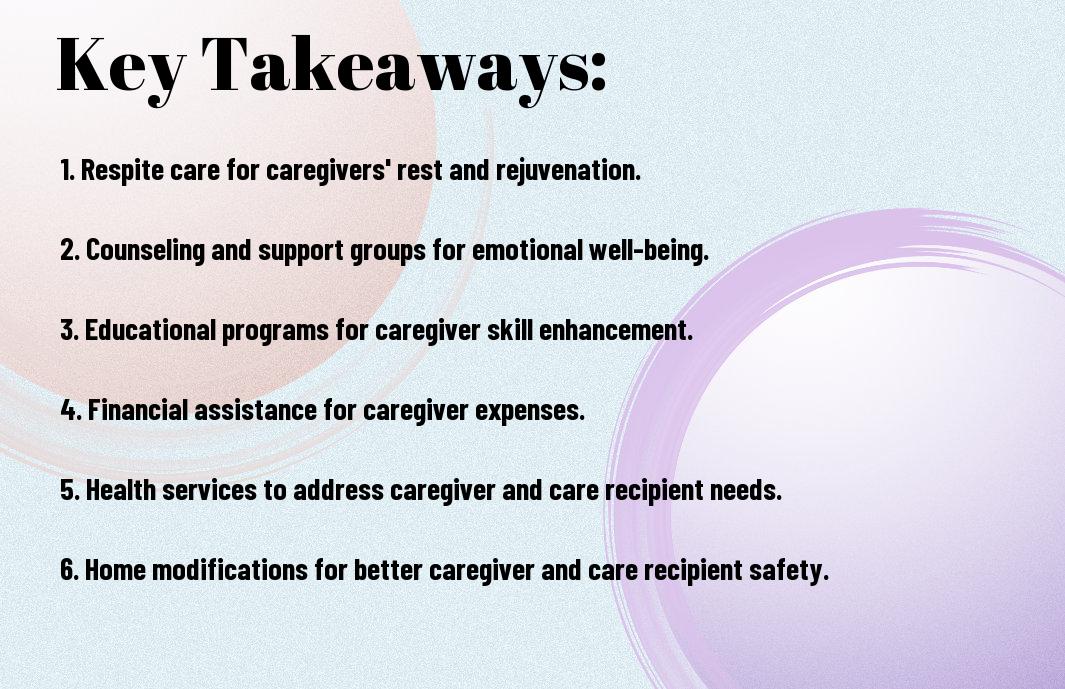It’s crucial for family caregivers to have access to supportive programs that can provide assistance and resources. In this list, we’ll explore the 10 best community programs that offer valuable support and services for family caregivers. From respite care to educational workshops, these programs aim to alleviate the challenges faced by family caregivers and enhance their overall well-being.
Key Takeaways:
- 1. Respite Care Services: Many community programs offer respite care services to provide relief to family caregivers by allowing them to take a break while professionals care for their loved ones.
- 2. Support Groups: Joining support groups through community programs can offer family caregivers emotional support, advice, and the opportunity to connect with others facing similar challenges.
- 3. Educational Workshops: Community programs often provide educational workshops to help family caregivers learn valuable skills, techniques, and strategies for better caregiving.
- 4. Financial Assistance: Some community programs offer financial assistance or grants to family caregivers to help alleviate the financial burden associated with caregiving responsibilities.
- 5. Access to Resources: Community programs provide access to various resources such as information, referrals, and services that can help family caregivers navigate the complexities of caregiving more effectively.

Adult Day Care Services
Socialization and Recreation
The socialization and recreational activities offered at adult day care services play a crucial role in enhancing the well-being of family caregivers and their loved ones. These programs provide a safe and stimulating environment where older adults can interact with their peers, participate in engaging activities, and enjoy meaningful social connections. By promoting socialization and recreation, adult day care services help combat feelings of isolation and depression that are common among both caregivers and care recipients.
Participating in group activities such as arts and crafts, music therapy, exercise classes, and games not only enriches the lives of older adults but also provides respite for family caregivers. The structured schedule of activities at adult day care services offers a break for caregivers while ensuring that their loved ones receive the mental stimulation and social engagement they need to thrive. These programs also help in maintaining cognitive function and emotional well-being, leading to an overall improvement in quality of life for both the caregiver and the care recipient.
Family caregivers can rest assured that their loved ones are in a secure and supportive environment while they take a much-needed break to attend to their own needs. Adult day care services offer a range of activities tailored to the interests and abilities of participants, ensuring that everyone can find enjoyment and fulfillment. Ultimately, the socialization and recreation provided by these programs contribute to a sense of community and belonging that is invaluable for both caregivers and their loved ones.
Health Monitoring Support
The health monitoring support offered at adult day care services provides peace of mind for family caregivers by ensuring that their loved ones receive proper medical attention and assistance. Trained staff members oversee medications, monitor vital signs, and coordinate with healthcare providers to address any health concerns that may arise during the day. This proactive approach to health monitoring helps prevent medical emergencies and ensures that older adults are receiving the care they need to maintain their health and well-being.
Support staff at adult day care services are equipped to handle a variety of health-related tasks, including assisting with activities of daily living, managing chronic conditions, and providing specialized care for individuals with complex medical needs. This comprehensive approach to health monitoring support ensures that family caregivers can confidently entrust the care of their loved ones to trained professionals who prioritize their well-being. By partnering with healthcare providers and specialists, adult day care services offer a holistic approach to caregiving that addresses the unique health challenges faced by older adults.
It is imperative for family caregivers to have access to reliable health monitoring support to ensure the safety and well-being of their loved ones. Adult day care services provide a structured environment where health needs are closely monitored and addressed, allowing caregivers to have peace of mind while they attend to other responsibilities. The professional staff and resources available at these programs enable older adults to receive personalized care that promotes their overall health and enhances their quality of life.

Home Health Care Aides
You can find home health care aides through various Caregiver Agencies Near Me and Organizations that offer support to family caregivers. Home health care aides provide valuable assistance to family caregivers by helping with daily tasks and providing companionship to their loved ones in need.
Personal Care Assistance
Any family caregiver knows the physical and emotional toll that caring for a loved one can have. That’s where home health care aides specializing in personal care assistance come in. These trained professionals can help with activities of daily living such as bathing, dressing, grooming, and toileting. By having a home health care aide assist with these tasks, family caregivers can have peace of mind knowing their loved one is being properly cared for.
Additionally, personal care assistance providers often offer companionship to the care recipient, which can help combat feelings of loneliness and isolation. Having a compassionate and skilled professional to engage with can greatly improve the quality of life for both the care recipient and the family caregiver.
With the help of home health care aides specializing in personal care assistance, family caregivers can rest assured that their loved ones are receiving the best possible care in the comfort of their own home.
Light Housekeeping Help
With the demanding responsibilities of caregiving, it can be challenging for family caregivers to keep up with household tasks. Light housekeeping help provided by home health care aides can make a significant difference in the daily lives of both the caregiver and care recipient.
Home health care aides offering light housekeeping help can assist with tasks such as laundry, dishes, sweeping, and dusting. By taking care of these chores, caregivers can focus their energy and attention on providing quality care to their loved ones without the added stress of maintaining a household.
Help with light housekeeping not only ensures a clean and safe environment for the care recipient but also promotes a sense of order and well-being in the home. Family caregivers can benefit greatly from this additional support, allowing them to better manage their caregiving responsibilities.
Respite Care Programs
Temporary Relief Options
Now, if you are a family caregiver in need of temporary relief, respite care programs offer a viable solution. These programs provide short-term care services to give caregivers a break from their responsibilities. Whether you need a few hours to run errands or a few days for a much-needed vacation, respite care programs can offer the support you need.
If you are feeling overwhelmed and in need of temporary assistance, respite care programs can step in to provide relief. These programs often involve trained professionals who can assist with activities of daily living, medication management, and companionship for your loved one. By utilizing respite care services, you can take the time to rest and recharge, knowing that your family member is in good hands.
Short-Term Care Solutions
Short-Term Care Solutions
Assuming you require a longer break from caregiving duties, short-term care solutions can be arranged through respite care programs. These solutions may involve your loved one staying in a residential facility for a designated period, receiving care from professional staff members. This option allows family caregivers to have an extended break while ensuring their family member receives quality care.
Caregiver Support Groups
After caregiving for a loved one, it is crucial for family caregivers to seek support for themselves. Caregiver support groups provide a safe space for individuals to share their experiences, gain advice, and receive emotional support from others in similar situations. These groups are often facilitated by professionals or volunteers and offer a variety of resources to help caregivers navigate the challenges they face. Support groups can be found through organizations like the National Family Caregiver Support Program.
Emotional Support Network
Network with other caregivers who understand the emotional toll of caring for a loved one. Sharing your feelings and experiences in a supportive environment can help reduce feelings of isolation and burnout. By connecting with others facing similar challenges, caregivers can find comfort, validation, and strength in knowing that they are not alone in their journey.
Educational Resource Sharing
You can benefit from caregiver support groups by gaining insights into various aspects of caregiving, such as managing stress, navigating healthcare systems, and finding local resources. These groups often provide educational materials, guest speakers, and workshops to help caregivers enhance their skills and knowledge. By sharing resources and strategies, caregivers can learn from each other and develop effective caregiving techniques.
Sharing information and resources within a supportive community can empower caregivers to make informed decisions and improve the quality of care they provide to their loved ones. Educational resource sharing allows caregivers to stay updated on the latest developments in caregiving practices and access valuable tools to enhance their caregiving experience.
Meal Delivery Services
Many family caregivers find it challenging to balance their caregiving responsibilities with preparing nutritious meals for their loved ones. Meal delivery services can be a lifesaver in such situations, offering convenient and healthy meal options that can save time and ensure proper nutrition for the care recipient.
Nutritious Meal Options
Assuming the role of a family caregiver can be overwhelming, leaving little time for meal preparation. Luckily, many meal delivery services focus on providing nutritious options tailored to specific dietary needs, making it easier for caregivers to ensure their loved ones are getting the right nutrients. These services often offer a variety of menu choices, including options for special diets like low sodium, diabetic-friendly, or gluten-free meals.
Grocery Shopping Help
Even with meal delivery services, there are times when caregivers may still need to venture out to purchase groceries for other household needs. Some community programs offer grocery shopping assistance to family caregivers, either by providing a designated shopping service or connecting them with volunteers who can help with grocery trips. This extra support can alleviate some of the burdens of caregiving and ensure that the household remains well-stocked with necessary items.
Any family caregiver knows that juggling caregiving duties with daily tasks like grocery shopping can be overwhelming. With the help of community programs that offer grocery shopping assistance, caregivers can find some relief and support in managing their responsibilities. Whether it’s assistance with creating shopping lists, picking up groceries, or even organizing pantry staples, these programs can make a significant difference in easing the caregiver’s load.

Transportation Assistance
Rides to Medical Appointments
Not being able to drive can be a significant barrier for family caregivers who need to get their loved ones to medical appointments. Many community programs offer transportation assistance specifically for this purpose. These services can provide a safe and reliable way for caregivers to ensure their family members receive the medical care they need.
Assistance with transportation to medical appointments can alleviate a huge burden for family caregivers. It allows them to focus on providing emotional support to their loved ones rather than worrying about how to get them to the doctor. By utilizing these services, caregivers can also ensure that their family members are attending appointments regularly and receiving necessary medical treatments.
Having access to transportation assistance for medical appointments can ultimately improve the overall well-being of both the caregiver and the care recipient. It promotes a sense of security and reliability, knowing that there is a designated way to get to crucial medical appointments without added stress or inconvenience.
Errand Running Services
For caregivers juggling multiple responsibilities, errand running services can be a lifesaver. These programs can assist with tasks such as grocery shopping, medication pick-ups, and other necessary errands that may be challenging for caregivers to manage on top of their caregiving duties.
Any additional support that can help lighten the load for family caregivers is invaluable. Errand running services not only save time and energy but also contribute to reducing the overall stress levels associated with caregiving. Caregivers can rest assured that these tasks are taken care of, allowing them to focus on providing the best possible care for their loved ones.
Home Modification Programs
Safety Improvement Grants
For family caregivers looking to make safety improvements to their homes, safety improvement grants are an excellent resource. These grants are often provided by local or state agencies and can cover expenses such as installing grab bars, ramps, or safety rails. By taking advantage of these grants, caregivers can create a safer environment for their loved ones, reducing the risk of accidents and injuries.
It’s imperative for family caregivers to research the eligibility criteria and application process for safety improvement grants in their area. Some programs may have specific requirements or limitations on the types of modifications that can be covered. By understanding the guidelines upfront, caregivers can better plan and budget for home safety improvements.
Overall, safety improvement grants can be a valuable tool for family caregivers seeking assistance with home modifications. By leveraging these resources, caregivers can enhance the safety and accessibility of their homes, making it easier to provide care for their loved ones.
Accessibility Renovation Help
The accessibility renovation help programs are designed to assist family caregivers in making their homes more accessible for their loved ones with physical limitations. These programs often provide financial assistance or low-interest loans to cover the costs of renovations such as widening doorways, installing stair lifts, or creating barrier-free bathrooms.
The goal of accessibility renovation help programs is to enable individuals with disabilities to live comfortably and safely in their homes. By participating in these programs, family caregivers can improve the quality of life for their loved ones while also reducing the physical strain of caregiving.
The accessibility renovation help programs typically require an assessment of the home to determine the necessary modifications. Caregivers should work closely with program coordinators to develop a renovation plan that meets the specific needs of their loved ones. With the support of these programs, caregivers can create a more inclusive and accommodating living environment for their family members.
Modification
Geriatric Care Management
All families involved in caregiving for elderly loved ones can benefit from the expertise of geriatric care managers. These professionals are trained to assist families in the caregiving process by providing support tailored to the unique needs of the individual and their family. Whether it’s helping to navigate complex healthcare systems, coordinating care between different providers, or ensuring that the care plan is being implemented effectively, geriatric care managers play a crucial role in easing the burden on family caregivers.
Care Planning and Coordination
Little details can often be overlooked when caring for an elderly family member, but a geriatric care manager can help ensure that all bases are covered. From creating a comprehensive care plan that addresses the physical, emotional, and social needs of the senior, to coordinating appointments and services, these professionals can help streamline the caregiving process and alleviate stress for family members.
Geriatric care managers have a deep understanding of the healthcare system and can advocate for the best interests of the elderly individual. By collaborating with healthcare providers, monitoring medications, and ensuring that the care plan is being followed, they help to optimize the quality of care received by the senior. This level of expertise and oversight can provide families with peace of mind knowing that their loved one is receiving the best possible care.
Medical Advocacy Support
The role of a geriatric care manager in providing medical advocacy support cannot be understated. They act as a valuable resource for families, helping them understand medical information, communicate effectively with healthcare providers, and make informed decisions about the care of their loved one. By bridging the gap between families and healthcare professionals, geriatric care managers ensure that the senior’s needs and preferences are at the forefront of all medical decision-making processes.
Financial Assistance
Keep in mind that caregiving can put a significant strain on your finances. Luckily, there are various financial assistance programs available to help lighten the financial burden on family caregivers.
One of the most well-known programs is the Family Caregiver Support Program, which provides financial assistance to family members who are caring for their loved ones. This program may cover expenses such as respite care, home modifications, and assistive devices.
Another valuable resource is the National Family Caregiver Support Program, which offers financial assistance for items such as transportation, counseling, and training for family caregivers.
It’s also worth looking into government assistance programs like Medicaid and Medicare, which may provide coverage for certain caregiving expenses. Additionally, some states offer cash assistance programs for family caregivers who qualify based on income and caregiving needs.
For military families, the VA Caregiver Support Program provides financial assistance, access to healthcare services, and other forms of support for family caregivers of veterans.
In addition to these programs, there are various non-profit organizations and charities that offer grants and financial assistance to family caregivers in need. Do your research and reach out to local community resources to explore all possible options for financial assistance.
Be mindful of, it’s important to take advantage of these financial assistance programs to help alleviate the financial stress of caregiving and ensure that you can provide the best possible care for your loved one.
FAQ
Q: What are community programs for family caregiver assistance?
A: Community programs for family caregiver assistance are initiatives and services provided by local organizations, government entities, or non-profit groups to support and assist individuals who are caring for family members or loved ones with health conditions or disabilities.
Q: How can family caregivers benefit from community programs?
A: Family caregivers can benefit from community programs by accessing resources such as respite care, support groups, educational workshops, counseling services, and financial assistance to help alleviate the physical, emotional, and financial burdens associated with caregiving.
Q: What are some common features of the best community programs for family caregiver assistance?
A: The best community programs for family caregiver assistance typically offer personalized support, caregiver training, coordination of services, access to healthcare professionals, and a range of resources tailored to the needs of both the caregiver and the care recipient.
Q: How can family caregivers find and access community programs for assistance?
A: Family caregivers can find and access community programs for assistance by reaching out to local eldercare agencies, healthcare providers, social workers, and non-profit organizations that specialize in caregiving support. Online resources and directories can also help caregivers locate relevant programs in their area.
Q: What are some examples of the top 10 community programs for family caregiver assistance?
A: Some of the best community programs for family caregiver assistance include the National Family Caregiver Support Program, Alzheimer’s Association support groups, AARP’s caregiving resources, local Area Agencies on Aging, Veterans Affairs caregiver support, Meals on Wheels programs, hospice care services, adult day centers, caregiver respite programs, and counseling services tailored to caregivers’ needs.



